Read Psalm 13 here (text coming …) or at Bible Gateway.
The Hebrew paragraph:
13:1-6 {p} Trusting in YHVH’s mercy when faced with enemies.
Psalm 13:1-6 Chiastic Structure:
How do the A pairs pair? Let’s look at the Hebrew Root Words to find out.
To forget is Strong’s H7911 שכח shakach, a primitive root meaning, “to forget, to ignore.” The 3-letter root is shin + kaph + chet.
shin ש = two front teeth, thus sharp, press, eat, two, again
kaph כ, ך = the open palm, thus bend, open, allow, tame
chet ח = the wall, thus outside, divide, half
Breath passes through the teeth (shin) as an opening (kaph) in a wall (chet). When we forget something, it escapes us as breath escapes the body. How interesting, though, the implication that what we remember, we keep enclosed behind a wall or a fortification.
To deal bountifully is Strong’s H1580 גמל gamal, a primitive root meaning, “to deal fully with, to recompense.” The 3-letter root is gimel + mem + lamed.
gimel ג = the foot, thus foot, walk, gather
mem מ, ם = the water, thus chaos, mighty, blood
lamed ל = the shepherd’s staff, thus teach, yoke, to, bind
To gather (gimel) at the water (mem), as wells, brooks, or springs are the places men, animals, and even plants congregate. The addition of the lamed adds the idea of a ruling, a decree, or a teaching, so that the parable is telling of congregating together (gimel + mem) to receive a ruling (lamed).
The negative spin on the verb is to do evil to someone, to repay evil for good, as in Psa 35:12, “They reward me evil for good, to the sorrow of my soul.” It’s positive spin is to do good to someone, as in 1 Sam 24:17, “Then he said to David, ‘You are more righteous than I; for you have rewarded me with good, whereas I have rewarded you with evil.’” Evil rulings dealing wickedly with the congregation; while good rulings deal bountifully with the congregation.
In 1A, David is complaining that YHVH has forgotten him because of the harshness of his circumstances. But when he takes the time to reflect on YHVH, on His past mercies, and on His past deliverances, he realizes the constancy of YHVH and His promise-keeping. By 2A, David is praising YHVH for His bountiful goodness.
The two verbs, to forget, and to deal bountifully, Compare and Contrast. It turns out that 1A was the lie that David’s heart heard at first, while 2A is the truth that David realized when he took the time to examine and discern truth from falsehood.


















Leave a Reply